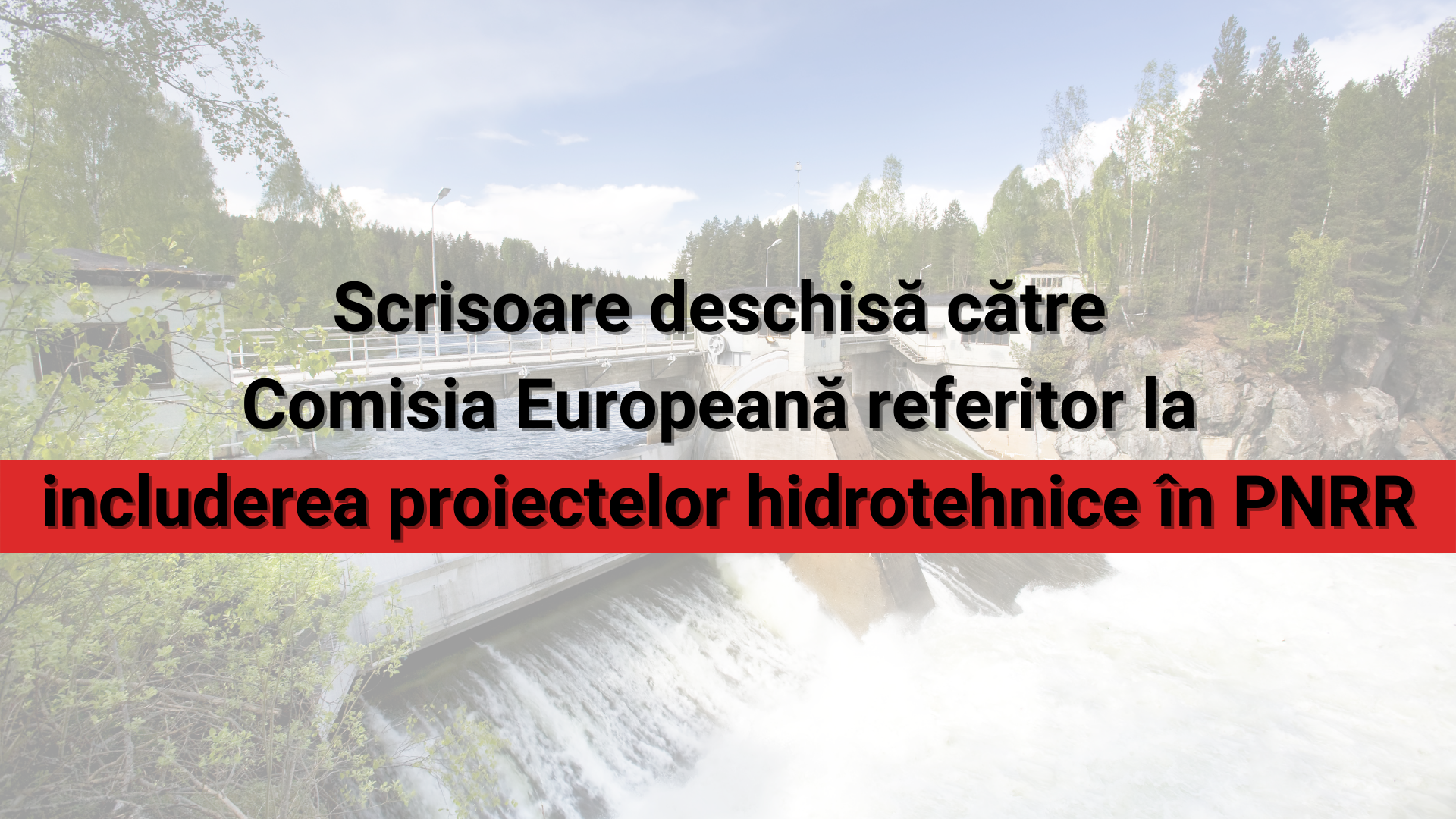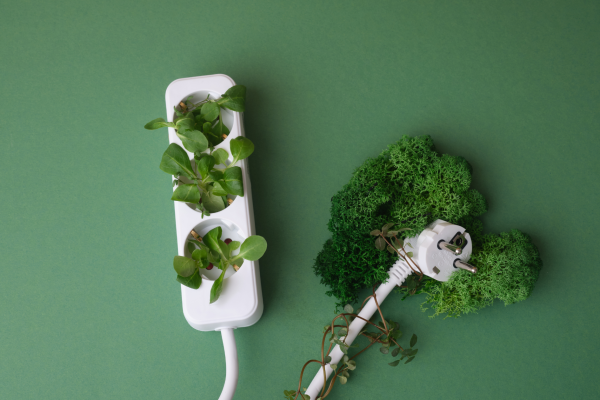Asociația Bankwatch România, alături de alte organizații de mediu și civice din țară, a semnat astăzi, 7 decembrie, Scrisoarea deschisă către Comisia Europeană referitor la includerea proiectelor hidrotehnice în PNRR.
Scrisoarea deschisă semnalează încă o dată Comisiei Europene, în mod oficial, că proiectele hidrotehnice propuse spre finanțare, de către Guvernul României, prin REPowerEU se bazează pe tehnologii învechite, iar realizarea lor ar încălca Directivele europene privind protecția mediului.
Redăm mai jos textul integral al Scrisorii deschise către Comisia Europeană referitor la includerea proiectelor hidrotehnice în PNRR:
Dear Madam President Ursula von der Leyen,
Dear Mr. Executive Vice President Timmermans,
Dear Ms. Céline Gauer, General Manager SG RECOVER, EC-RECOVER@ec.europa.eu
Dear Mr Virginijus Sinkevičius, European Commissioner for the Environment, cab-sinkevicius-contact@ec.europa.eu
*
We are writing to underline the disparity between the European Commission’s climate aims and the new projects proposed for inclusion via RePower EU.
In the context of climate change, turning to hydropower, which is based on an obsolete technology, contradicts the goals set in the European climate law (reduction of greenhouse gas emissions by 55%) and the RePowerEU plan (increase the proportion of wind and solar energy to 45%).
A study published in BioScience in late 2016 showed that dams and reservoirs contribute 25% more to global warming than previously thought. The authors of the study estimate that reservoirs emit one gigaton, or one billion tons, of carbon dioxide into the atmosphere annually.
In its green taxonomy report, the EU’s Technical Group of Experts on Sustainable Financing stated that „building of new hydropower facilities must not result in the fragmentation of rivers.” However, all projects part of the first draft of NRRP featured river fragmentation. Following a public debate in 2021, any outdated and illegal proposals were removed from the NRRP. This came in response to substantial public pressure (tens of thousands of citizens requesting this).
Now, Romania’s government wants to circumvent the results of the public debate and reinsert illegitimate projects into the NRRP. A list of eleven hydropower projects is currently being circulated for inclusion into the NRRP via REPowerEU.
All 11 projects were designed during the Ceausescu dictatorship and this in complete disregard for people and the environment:
- AHE Jiu (Livezeni-Bumbești) was declared illegal via a final verdict issued by the Bucharest Court of Appeal. If realized, it would completely destroy the Jiului Gorge National Park. According to the publication Science the expected impact is estimated to be on a global scale. More than 33,000 Romanians have demanded in a petition that the illegal project be halted, a petition that is referenced in the most recent environmental report on Romania by the United Nations. The EU CHAP(2016)01813 complaint over the destruction of the Defileul Jiului National Park/Defileul Jiului Natura 2000 site was closed because the Court of Appeal’s final ruling would have concluded the matter. Nonetheless, there are two emergency legislation proposals in the Parliament that seek to sidestep this court verdict. One of them was resubmitted despite having been declared unconstitutional and the European Commission having concluded that it violates EU law.
- APM Sibiu rejected the AHE Caineni – Lotrioara project as the SEICA analysis revealed a major impact on the water body. Additionally, the project entails the degradation of the Natura 2000 site „Oltul Mijlociu – Cibin – Hârtibaciu.”
- CHE Islaz entails the degradation of multiple Natura 2000 sites. The deterioration of the Ramsar site „Olt Danube Confluence” was a topic of discussion during the 2012 Ramsar Conference held in Bucharest. This dam project was rejected by Romania’s Agency for Environmental Protection via Decision 4/2015.
- The Cosmești – Movileni project entails the destruction of a portion of the „Lunca Siretului Inferior” Natura 2000 reserve. The Galati Environmental Protection Agency rejected the proposal via decision 603/2016.
- AHE Cerna Motru Tismana II: This project is located within a Natura 2000 site designated for fish species (north of the Western Gorj). Its expansion would be illegal as it would lead to the loss of an even bigger portion of the Bistriţa Gorjană river. In its current form, the project was implemented by redirecting the flow of the Bistrita Gorjană river into another hydrographic basin. In 2008, the deviation occurred in breach of the Water Framework Directive.
- The Belareca – Cerna project entails redirecting one of the country’s most valuable rivers, the Belareca River. Therefore, not only the Water Framework Directive but also the European Landscape Convention would be violated. It has a cumulative effect with the Ramna hydroelectric project, for which an infringement proceeding was launched via case INFR(2015)4036.
- AHE Rastolita will lead to the disparition of the lostriță population (Hucho hucho). The harmful project is referenced in the 2015 FFSG annual report. Moreover, it involves the deforestation of a large surface of the Călimani National Park. The Mures Environmental Protection Agency breached the Aarhus Convention by refusing to evaluate the timely-sent comments.
- AHE Surduc-Siriu is a project for which the international community has urged its halting since 2019. It was subject to legality review via case number 1259/117/2020. The building permit was revoked by a final verdict issued by the Cluj Court of Appeal in June 2022.
- AHE Pașcani on the Siret River violates the Water Framework Directive by destroying a water body, a section of the Siret River.
The eleven hydrotechnical projects do not take into account the scale and pace of changes that have taken place at the EU level and, in result, do not meet the goals set by the EC, including the need to reduce greenhouse gas emissions by 55 percent by 2030 or decarbonize the economy, and achieve climate neutrality by 2050.
The risks associated with financing these hydropower projects extend beyond their destructive environmental impact. The unauthorized construction in the National Park of Defileul Jiului is the subject of criminal file 100/P/2021 at the Alba-Iulia Territorial Service of DNA. By continuing the construction, an attempt is made to „cover up” the illegal construction, thus obstructing justice. In addition, the breach of preceding court decisions constitutes an assault on the rule of law.
If the Commission approves the financing of illegal projects that contravene a number of directives and judgements of the EU Court of Justice, the Commission will be unable to fulfill its position as Guardian of the Treaties. The PNRR must be conditioned on the rule of law, and by this assault on the rule of law, the Romanian government, particularly the Ministry of European Investments and Projects, jeopardizes any funding from the PNRR and, consequently, a multitude of beneficial projects under this plan.
Luring the Commission into a trap is the only stake of this financing, because the projects in question do not have financing issues, but legality (authorization) issues. Their financing is secured as their owner, Hidroelectrica, reported a profit of 3.5 billion lei in just nine months. Hydropower investment should prioritize the company’s existing 209 hydroelectric facilities, which are all operating considerably below capacity due to a lack of maintenance. At these hydropower plants, the environmental impact has already occurred; thus, maintenance and modernization should be the priorities. It is possible to double production with no additional environmental impact. The future of hydropower lies in retrofitting and perhaps in closed-loop pumped-storage hydropower stations, although the scientific community is still wary of the latter option.
Given the studies quoted and given that the dams constructed for hydropower plants (with the implied purpose of producing renewable energy) contribute to an increase in greenhouse emissions, allocating EU funds to develop them is in conflict with the European Commission’s stated goals.
Lastly, all of these projects are ineligible since „no significant harm” is an essential eligibility criteria of the PNRR. Therefore, their funding is inconceivable. Each of these projects has a substantial detrimental impact on a number of water bodies and Natura 2000 sites, as well as a number of protected species and ecosystems, some of which are even priority ones.
We request that you reject any attempt by the Romanian government to renegotiate the PNRR or finance any of the 11 hydrotechnical projects through RePower EU.
We would be happy to assist the EU Commission on this matter, and we would like to discuss the next steps with you as soon as possible.
We look forward to hearing from you and remain,
Yours truly,
Asociația Declic
E-mail: contact@declic.ro
Web: www.declic.ro
Roxana Pencea-Bradatan, președinte
Organizația Salvați Prutul, Iași, România
E-mail: asociatia.osp@gmail.com
Web: https://osp-iasi.ro/
Sorin Iftene, vice president
Asociația Fly Fishing Club Sibiu
Email: darius.scoica@gmail.com
Web: https://flyfishingclubsibiu.ro/
Scoica Darius Aurel, președinte
Asociatia Pescarilor Sportivi Bega Poieni
Email: contact@begapoieni.ro
Web: https://www.begapoieni.ro
Radu Calomfirescu, presedinte
ECPI-Euroregional Center for Public Initiatives
Email: florinbuhuceanu@yahoo.com
Web: https://www.ecpi.ro/, www.drepturisexuale.ro
Florin Buhuceanu, președinte executiv
Agent Green
Gabriel PAUN, Presedinte
office@agentgreen.org
Fundația Eco-Civica
E-mail: fundatia.ecocivica@gmail.com
Dan Trifu
Vicepresident
Federatia Coalitia Natura 2000
George Kudor
Director executiv
Asociatia „Grupul Pescarilor Sportivi din Oradea”
Budai Janos,
Presedinte
Asociatia Fly Fishing Bistrita
Piroska Antal Lajos
Președinte
Asociația Pescarilor Sportivi Aqua Crisius
contact@aquacrisius.ro
Andrei Togor,
Președinte
Asociația Bankwatch Romania
Ioana Ciută.
Președinte
Societatea Carpatină Ardeleană – Satu Mare
János MÁRK-NAGY
President
Asociatia Clubul Muscaricilor Timisoara
Tudor Adrian Vreme-Moser
Președinte
ECOTOP Oradea
Web:https://www.ecotoporadea.ro
George Claudiu Togor
Presedinte
Asociația ”Reptilia”
Email: exoticvet_umf@yahoo.com
Bogdan Cordoș, președinte
Valea Jiului Society
Email: valea.jiului.society@gmail.com
Website: https://www.valeajiuluiimplicata.org/
Adina Vințan, President
Asociația Cu Verdele-n Sus
Email: verdelesus@gmail.com
Website: verdelesus.ro/
Radu Tompa, President
Asociatia civica VOLUNTARI IN EUROPA
Email:info@voluntarieuropa.com
Website:www.voluntarieuropa.com
Adriana Muresan, Presedinte
Fundatia Valea Bistritei
Email: contact@valeabistritei.org
Website:https://www.valeabistritei.org
Emil Catalin Schiopu, Vicepresedinte
Asociatia Copii pentru Viitor
Email: copiipentruviitor@gmail.com
Website: www.copiipentruviitor.ro
Ancuta Cristina Iordanescu, Presedinte
Asociația Platforma Reset
Email: resetiasi@gmail.com
Website: www.resetiasi.ro
Daniela Mitrofan, președinte
Asociația Aradul Civic
Email: office@aradulcivic.ro
Website: https://www.aradulcivic.ro/
Daria B. Nistor, președinte
Asociația civică #activAG Pitești
Email: asociatiaactivag@gmail.com
Website: https://activag.ro
Traian Paparete, President
Fundația Greenpeace România
Email: info.romania@greenpeace.org
Website: https://www.greenpeace.org/romania/
Ciprian Gălușcă, forest and biodiversity campaigner
Asociația Speologică Exploratorii
Email: Aser_ro@hotmail.com
Website: https://www.exploratorii.org/
Bogdan Bădescu, președinte
Asociația Euroland Banat
Email: andrei.szabo@yahoo.com
Website: http://www.greenbanat.ro/
Andrei Szabo, președinte
Societatea Ecologică Aquaterra – Filiala Iași
Email: dgrigore2@gmail.com
Grigore Davideanu, președinte




